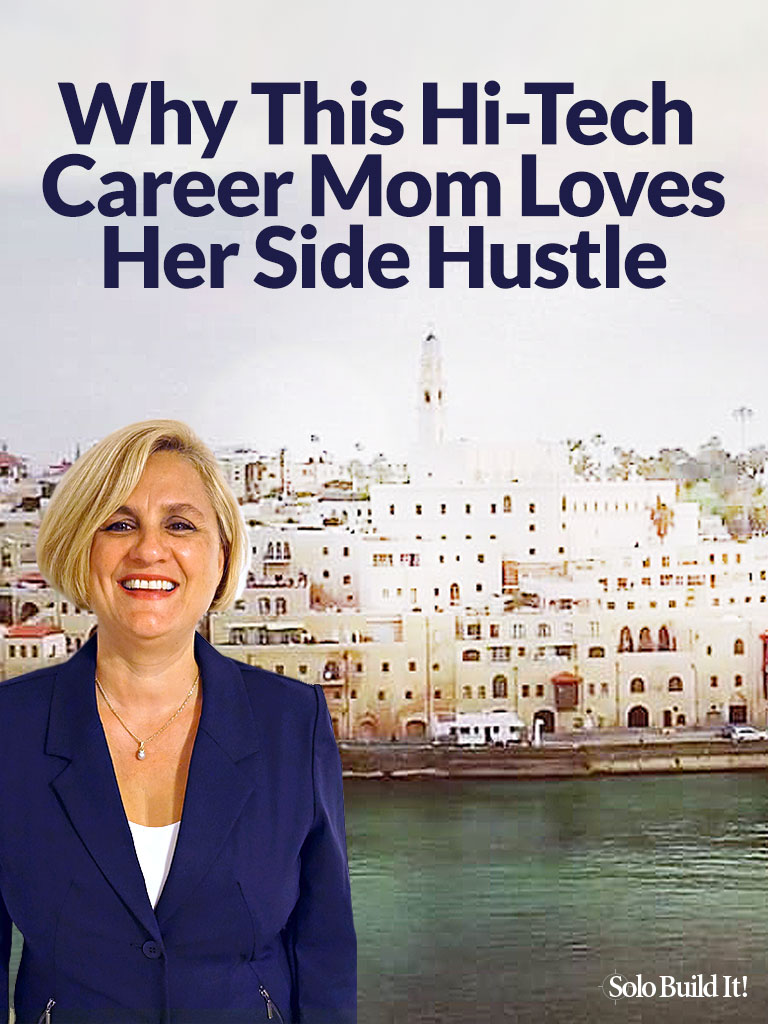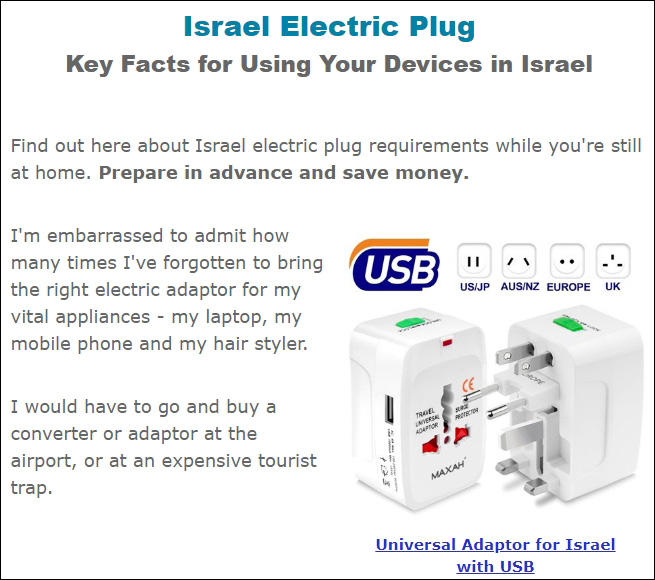In my professional career, I was often involved in designing or contracting out website development. In the early days, we built ‘beautiful’ websites to convey messages about the company and its products, just like an online brochure. It amazes me how many serious companies stop there, even today.Ayelet Porat from www.go-telaviv.com
Despite her professional experience with creating websites, hi-tech business executive Ayelet Porat said she only understood how the Internet worked after she found Solo Build It! (SBI!).
Following SBI!’s timeless principles of creating high-quality content around in-demand topics, she no longer needed to rely on advertising or SEO tricks to get traffic to her website.
She could even apply what she learned at the start-up companies she worked at. But let’s back up a bit. Why does a sought-after hi-tech sales manager start a website about Tel Aviv? And how did she develop this side-hustle into a steadily growing additional income stream?
That are just some of the questions we asked Ayelet in our exclusive interview.
1. Ayelet, you are a successful hi-tech business executive. What made you decide to build an online business? And why about Tel Aviv?
I was an ambitious hi-tech sales manager for many years. I enjoyed my work, but once I started a family, I found the juggling act between being a good Mom and a successful business executive quite difficult to manage.
At various points in my career, I tried out different solutions to achieve a better work-family balance:
- I worked and employed an au-pair to help with the kids and housework.
- I stopped working completely.
- I purposely went “down” the career ladder.
- I worked as an external consultant.
I constantly struggled and dreamt about finding the best solution. Starting an online business seemed like a great step in the right direction.
Why write about Tel Aviv? There are a zillion topics that interest me. I considered genealogy, which is something I love, but I don’t feel I’m enough of an expert in this field. I toyed with the idea of writing about my professional field of expertise, enterprise hi-tech sales, but I wanted a break from that!
In the early days of my website, I partnered with my good friend Nathalie, a hi-tech marketing gal. Both of us had moved to Tel Aviv many years ago, she from Paris and I from New York. We both loved Tel Aviv.
After keyword research with SBI!’s Brainstorm It! tool, we saw that it was a good topic. And that was that.
Should you stop working completely, switch to a less demanding position, reduce to part time, or find a work-from-home opportunity? It’s not an easy decision to make. You’ll have to consider the financial and personal consequences carefully.
Ayelet tried several options and finally found her ideal solution — starting an online business. It brought her the benefits she was looking for:
- She can work from home, at her own pace.
- It gives her a nice break from her job, as the topic has nothing do with her career.
- It has the potential to grow into a full or partial replacement of her current income.
2. Despite your professional experience with creating websites, you said you only began to understand how the Internet worked after you found Solo Build It!. Can you tell us more about that?
In my professional career, I was often involved in designing or contracting out website development. In the early days, we built “beautiful” websites to convey messages about the company and its products, just like an online brochure. It amazes me how many serious companies stop there, even today.
It does not. In recent head-to-head studies we learned that SBI! members are 33X more likely to build high-traffic sites than Squarespace users, and 115X more likely than Wix users.
When site owners don’t get the results they expected from those “beautiful” sites, they have to either pay for traffic or try all kinds of techniques — some questionable, and all of them short lived — to get at least some visitors to their sites. Let’s hear what Ayelet has to say about that topic…
Over time, we learned about search engine optimization (SEO). We started using keywords and we invested in buying ads to generate leads. Many of our external consultants used all kinds of SEO tricks to generate traffic.
But thanks to SBI!, I understood the logic behind the internet rather than search engine “tricks.” I was even able to apply what I learned from SBI! at the startup companies I worked at. Things like…
- How the basic business principle of supply and demand is just as relevant in the internet, and can be applied to select the best keywords to write about to attain high scoring pages.
- How to always consider who your typical target reader is, and how to write great content so that he/she will want to continue reading. Not just readers will love that, search engines will notice and send more traffic.
- How to present great content based on proven internet reading habits.
It starts with researching and refining the best possible niche for your interests, goals and time availability, and ends with planning, implementing and optimizing the best monetization methods. In between there’s a lot of writing outstanding content, tailored to the needs of your audience, building up trust with your readers, and much more.
All of this is explained step-by-step in SBI!’s 10-Day Action Guide. No guessing, and no tricks involved. You’ll know exactly what to do, and how to do it, every step along the way.

3. Tell us about your philosophy regarding content. How do you know what your prospective customers are looking for? Where does this information come from?
I choose to write content based on keyword results and research using Brainstormer.
There are two main exceptions. I sometimes publish pages that may not have an ideal score as part of my cooperation with a referral/finder that generates an income stream.
The other exception is if I have a guest writer who is willing to contribute content on a topic that I am not familiar with, or which I would have a hard time researching. For example, I was recently contacted by someone writing a neat, new website on hiking in Israel.
Besides exchanging links, he wrote me a page (which I always reserve the right to edit) and supplied great photos. So even though the page’s keyword demand is relatively low, my time investment is quite low too.
The Brainstorm It! tool spares the solopreneur the time-consuming, laborious process of developing and researching hundreds of keywords (topics and subtopics) that become the website’s theme.
It also brings back demand and supply numbers for each keyword. You’ll know how many people search for this term (demand) and how many web pages are already talking about it (supply or competition). Ideally, you want to write about topics that have high demand and low supply.
But — computers cannot think. They collect and report data with incredible efficiency. But they cannot ask themselves, “Does this make sense for my niche?”
So, at all times, “be like Ayelet!” Of course, do keyword research. And then, use your knowledge and understanding of your niche, and your passion for the subject, to make the final calls. If this also leads to a mutually beneficial relationship with a guest writer or a monetization partner, all the better.
4. You provide lots of information and resources for free. How do you “upgrade” people from being free-content seekers to paying customers?
All the content and resources I provide are free of charge. Aside from passive income, I am constantly thinking about what a tourist would be willing to pay for when they hit a website travel blog such as mine.
I consider what I would be willing to pay for if I were planning to travel somewhere, which is not much! I monetize by preselling and tempting customers with interesting services and products that they may not have thought of initially.
What information, product or service would be helpful to you if you were — to stay with Ayelet’s example — planning a trip to Tel Aviv?
Second, put your visitors in an “open to buy” frame of mind. How? By providing lots of highest quality information for free. Information that’s tailored to your readers’ needs and desires (see lesson #1), presented in your unique “voice.”
When your readers like what they see, they will come back, subscribe to your newsletter or follow you on social media. We call this process “PREselling.” It’s the crucial step that comes before monetizing.
Want to learn more about PREselling, developing your unique voice and how to connect with your readers in a genuine way? Download our eBook “Make Your Content PREsell!” for free here.

5. How many different income streams do you have? Which ones perform best?
My current income streams, in order of performance from highest to lowest are: finder’s fees, Amazon’s Associate Program, Google AdSense, and other affiliate programs.
Finder’s Fees — I make most of my income from finder’s fees, which I far prefer to affiliates because I earn at least 10% commission or more. The main possible “danger” is the need to have a solid trust relationship. I have several of these partnerships and am always on the lookout for more.
Amazon — I sell a few books on Israel via Amazon, but the sales are low. I hit upon my Amazon “bestseller” by chance. I wrote a page about the electricity adaptor needed for Israel, and linked to relevant adaptors in Amazon. This became a hit and generates a nice, steady income. It seems so obvious but I would never have thought of it without Brainstormer.
Google AdSense — A few months ago I activated “auto ads,” a new AdSense feature, which doubled my earnings. I plan to continue with personalized ads in line with GDPR requirements.
Other Affiliate Programs — I work with affiliates for group tours, Israeli products, hotels, and more. Since I currently don’t have the time to develop my own products, I want to more actively promote Israeli products via suitable affiliate programs.
If I give up my day job or when I decide to retire, I will focus my monetization on creating products of my own to sell.
Ayelet promotes her “Amazon bestseller,” a travel adaptor for Israel, on a dedicated page, detailing her experience with the device. When a reader clicks on the link and buys the adaptor, Ayelet earns a commission. You can see the full page here.
Even Ayelet, with her background as a high-tech business executive, admits that she only understood how “the Internet worked” after starting with SBI!. When you take the time to work through the Action Guide step-by-step, you’ll learn everything you need to know to become successful online.
For example, DAYs 4 and 10 of the Action Guide are focused on monetization. You’ll understand the various ways to earn an income with your website, from passive methods like advertising and affiliate marketing to active methods, like developing and selling your own products or services.
You’ll get a handy checklist to evaluate how suitable each method is for your niche and your personal circumstances. Building your business in your spare time, in addition to your day job? Start with passive monetization methods, which are easier to implement and maintain.
The more your “spare time” grows, e.g., by reducing to part-time or retiring, the more “active” you can go with your monetization methods.
6. How long did it take to start earning income from your online business? Is it a full-time or a part-time income?
Go-TelAviv.com provides me a part-time income that continues to grow steadily. It took about a year to start seeing initial AdSense and affiliate income trickling in.
The biggest boost in revenue came when I started forming finder partnerships.
Given that I work only a few hours a week and have only written a mere 150 pages, the finder income is instrumental in generating some decent revenue.
The tricky part of the finder’s fee model is to ensure that you get paid for your referral. Because — unlike affiliate programs — there’s no automated system in place to track that this person was referred from your site.
So we asked Ayelet how she ensures she gets paid. But before we get to the payments, we first wanted to know…
How do you find and approach potential partners?
I am always on the lookout for possible services or products that could benefit my readers. I’ve been a business person for many years, so approaching potential partners is easy for me.
But even if you are less experienced, it really isn’t difficult. You aren’t asking for any favors; you’re suggesting a win-win business cooperation. After you do it once or twice, it will become easier. And if one potential partner isn’t interested, there are lots of other fish to fry.
I talk with the potential partner about my website, about the traffic it generates on a daily and monthly basis, and how it can be a great way to generate quality leads for them.
I explain which pages I will write to support the business cooperation and any other techniques (social media, newsletter, etc.) to promote them. In return, I ask them for lots of information and pictures.
Even though I am actively “selling” my referral service, I make sure to purposefully keep their expectations low, explain that it takes time to generate leads, etc. They will be responsible for replying to form submissions and closing the sale.
A finder commission should always be higher than an affiliate commission. I will not run such a valuable lead-generating service with dedicated content pages, without getting at least 10%; for low-cost products I ask for a higher percentage. It also depends on the “market-rate” for a finder’s fee for that particular product or service.
After talking on the phone and/or via email, I always try to meet face-to-face — if possible — to get a “gut feel” for the person. Depending on the person or company, I occasionally sign a basic finder agreement (you can find templates on the web and adapt them).
At the minimum, I summarize the agreed terms in an email, with a “call to action” request for a confirmation. If the cooperation doesn’t bear fruit or if I suspect they are bypassing me, I will know that fairly quickly and just get rid of the online form and — if necessary — the relevant pages I wrote to support the venture.
How do you ensure that you get paid (as there is no automatic link tracking, as with affiliate programs)?
Every time a reader fills out an online form, I make sure that both the other party and I receive copies of the form, and I insist that I am copied on all the follow-up correspondence.
So I see the progression from interest, to follow-up, to price quote, to deal closing. If an opportunity seems to have died (as most do), I usually follow up to make sure.
If there seems to be reader interest, but no sales are being closed, it can either indicate that there’s a problem with the service being offered (which might need to be altered in some way), or that something fishy is going on. In both cases, I will eventually stop offering that service.
To sum it up: The finder’s fee method is not foolproof, but for me, it’s the best income stream without a product to sell.
Let’s summarize the key points:
- Keep your eyes peeled for potential partners.
- Get yourself in the right mindset: you’re not asking for a favor, you’re proposing a win-win business deal.
- Explain clearly the high value of your potential leads while managing expectations.
- Ask for lots of information and images, so that you can create great PREselling pages to explain your partner’s service or product to your reader. (If you find it difficult to write that page, consider doing it in interview format.)
- Add contact forms to your PREselling pages. Make sure that both you and your business partner get a copy of the contact request. (This is super easy to do with SBI!’s form builder. Here’s an example of a such a page with a contact form on Ayelet’s site.)
- Insist on being included (or at least informed) about follow-up communications between your business partner and the customer.
- If you suspect that you aren’t getting paid, or that there’s some other problem with delivery of the service or product, follow up with the person you referred. After all, he or she came to your website first, so you want to make sure s/he gets the best possible experience from your partners.

7. How do you “do it all”? How do you combine a demanding job with having time for your family and building an online business?
I have occasionally asked myself why bother keeping up with the online business, given my demanding day job…
But the truth is that I am proud of having built this fun hobby/business on a topic I love. It still amazes me (and even more so my husband!) that for the cost of the annual SBI! fee, I am generating a part-time income.
Maybe I am keeping it for retirement. Maybe one of my kids will take it over one day. But I won’t give it up!
By then, she had already built a solid foundation for her Go-TelAviv.com business. So why not keep it?
One of the coolest benefits of an online business is its flexibility. Contrary to a regular job, or a brick-and-mortar store, you can put it in “maintenance mode” for a while, and pick it up full steam when you’re ready.
8. What do you enjoy most about being an online business owner? How has it changed you, your life, your family?
I am surrounded by entrepreneurs. I grew up with a father who built himself and his business from scratch. My husband also runs his own businesses, and he would have a hard time working for someone else. So the entrepreneurial spirit, the mindset of building something on my own, feels very natural for me.
Also, now that my children are young adults and they see me working on my website, I think that it inspires them. Seeing me spend free time on Go-TelAviv.com teaches them about how succeeding at anything is about hard work and grits.
At the same time, they see that beyond a classic day job working for someone else, there are untraditional ways of earning a living. I believe this is especially relevant for generation Y.
Who wouldn’t want their children to understand the value of building something of their own, especially if that “something” has the potential to give them financial and personal freedom?
For young people, building an online business has another, invaluable benefit: it teaches them skills that are essential whether they choose a “traditional” career or stay on the solopreneur path.
Plus, it’s simply fun and rewarding to express your creativity while providing value to others. That’s at least what teenpreneur Sydney Englund told us. She started her online business at the tender age of 9 years!

9. And finally. What’s your top tip for someone who is just starting a solopreneur career?
Like everything else in life, I believe there is mainly one formula for success as a solopreneur. Being smart helps, but it isn’t enough. Writing about a topic you love makes it more fun, but I don’t believe it’s essential.
The secret sauce is persistence, persistence and more persistence. You need to follow the Action Guide and do the work. You need to think deeply about monetizing. You always have to be ready for changes along the way, just like in life.
If you have the patience and determination for a marathon run that never ends, there is no reason why you can’t succeed.
Key Takeaways from Ayelet’s Story
- Looking for a career change or better work-life balance? Building a passion-based online business might just be the perfect solution for you.
- Don’t be fooled by the promise of “stunning websites.” A beautiful look alone does not generate traffic and income.
- Base your content decisions on keyword research and niche knowledge. The business principles of demand and supply apply online as well.
- Building your business in your spare time? Start with passive monetization methods. Develop more active methods as your time availability increases.
- Consider finder’s fees (referrals or lead generation) as a way to monetize passively, but with higher profit margins than you get from ads or affiliate programs. When you negotiate with potential partners, remember: You’re not asking for a favor; you’re proposing a win-win business deal.
- Teach your kids by example that there are more ways to earn a living than with a traditional 9-to-5 job!

Latest posts by Margit Streifeneder (see all)
- From Traffic Peaks to Auto-Pilot: A Psychologist’s Website Success Story - March 27, 2025
- From Swim Teacher to Solopreneur: Building Passive Income Online - February 27, 2025
- From Concierge to Global Tours: 10 Lessons for Travel Business Growth - December 19, 2024




